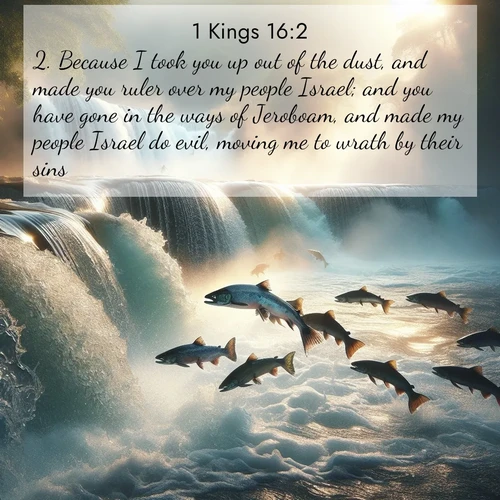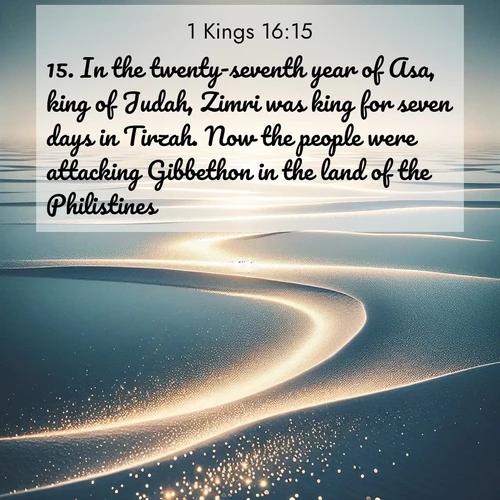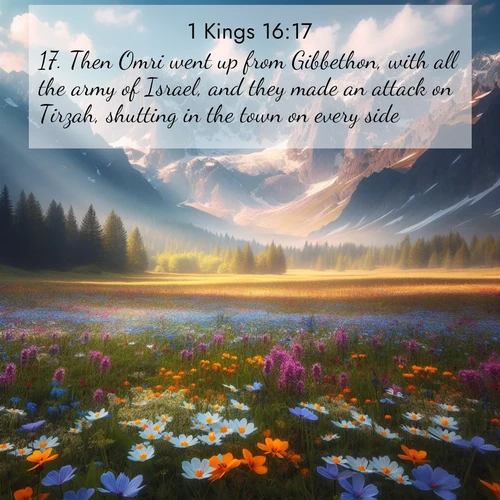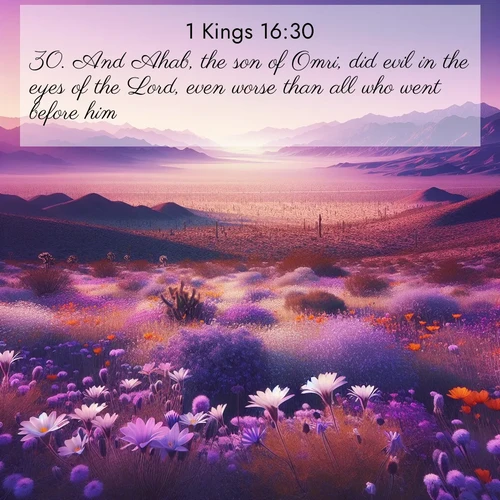Basic English Bible Images: Beautiful Images of 1 Kings Chapter 16 Verses
1 Kings 16:1. And the word of the Lord came to Jehu, son of Hanani, protesting against Baasha and saying,
Read the verse in its context:
Basic English 1 Kings 16
1 Kings 16:2. Because I took you up out of the dust, and made you ruler over my people Israel; and you have gone in the ways of Jeroboam, and made my people Israel do evil, moving me to wrath by their sins;
Read the verse in its context:
Basic English 1 Kings 16
1 Kings 16:3. Truly, I will see that Baasha and all his family are completely brushed away; I will make your family like the family of Jeroboam, the son of Nebat.
Read the verse in its context:
Basic English 1 Kings 16
1 Kings 16:4. Anyone of the family of Baasha who comes to death in the town, will become food for the dogs; and he to whom death comes in the open country, will be food for the birds of the air.
Read the verse in its context:
Basic English 1 Kings 16
1 Kings 16:5. Now the rest of the acts of Baasha, and what he did, and his power, are they not recorded in the book of the history of the kings of Israel?
Read the verse in its context:
Basic English 1 Kings 16
1 Kings 16:6. And Baasha went to rest with his fathers, and was put into the earth at Tirzah; and Elah his son became king in his place.
Read the verse in its context:
Basic English 1 Kings 16
1 Kings 16:7. And the Lord sent his word against Baasha and his family by the mouth of the prophet Jehu, the son of Hanani, because of all the evil he did in the eyes of the Lord, moving him to wrath by the work of his hands, because he was like the family of Jeroboam, and because he put it to death.
Read the verse in its context:
Basic English 1 Kings 16
1 Kings 16:8. In the twenty-sixth year that Asa was king of Judah, Elah, the son of Baasha, became king of Israel in Tirzah, and he was king for two years.
Read the verse in its context:
Basic English 1 Kings 16
1 Kings 16:9. And his servant Zimri, captain of half his war-carriages, made secret designs against him: now he was in Tirzah, drinking hard in the house of Arza, controller of the king's house in Tirzah.
Read the verse in its context:
Basic English 1 Kings 16
1 Kings 16:10. And Zimri went in and made an attack on him and put him to death, in the twenty-seventh year that Asa was king of Judah, and made himself king in his place.
Read the verse in its context:
Basic English 1 Kings 16
1 Kings 16:11. And straight away when he became king and took his place on the seat of the kingdom, he put to death all the family of Baasha: not one male child of his relations or his friends kept his life.
Read the verse in its context:
Basic English 1 Kings 16
1 Kings 16:12. So Zimri put to death all the family of Baasha, so that the word which the Lord said against him by the mouth of Jehu the prophet came about;
Read the verse in its context:
Basic English 1 Kings 16
1 Kings 16:13. Because of all the sins of Baasha, and the sins of Elah his son, which they did and made Israel do, moving the Lord, the God of Israel, to wrath by their foolish acts.
Read the verse in its context:
Basic English 1 Kings 16
1 Kings 16:14. Now the rest of the acts of Elah, and all he did, are they not recorded in the book of the history of the kings of Israel?
Read the verse in its context:
Basic English 1 Kings 16
1 Kings 16:15. In the twenty-seventh year of Asa, king of Judah, Zimri was king for seven days in Tirzah. Now the people were attacking Gibbethon in the land of the Philistines.
Read the verse in its context:
Basic English 1 Kings 16
1 Kings 16:16. And news came to the people in the tents that Zimri had made a secret design and had put the king to death: so all Israel made Omri, the captain of the army, king that day in the tents.
Read the verse in its context:
Basic English 1 Kings 16
1 Kings 16:17. Then Omri went up from Gibbethon, with all the army of Israel, and they made an attack on Tirzah, shutting in the town on every side.
Read the verse in its context:
Basic English 1 Kings 16
1 Kings 16:18. And when Zimri saw that the town was taken, he went into the inner room of the king's house, and burning the house over his head, came to his end,
Read the verse in its context:
Basic English 1 Kings 16
1 Kings 16:19. Because of his sin in doing evil in the eyes of the Lord, in going in the way of Jeroboam and in his sin which he made Israel do.
Read the verse in its context:
Basic English 1 Kings 16
1 Kings 16:20. Now the rest of the acts of Zimri, and the secret design he made, are they not recorded in the book of the history of the kings of Israel?
Read the verse in its context:
Basic English 1 Kings 16
1 Kings 16:21. Then there was a division among the people of Israel; half the people were for making Tibni, son of Ginath, king, and half were supporting Omri.
Read the verse in its context:
Basic English 1 Kings 16
1 Kings 16:22. But the supporters of Omri overcame those who were on the side of Tibni, the son of Ginath; and death came to Tibni and to his brother Joram at that time: and Omri became king in the place of Tibni.
Read the verse in its context:
Basic English 1 Kings 16
1 Kings 16:23. In the thirty-first year of Asa, king of Judah, Omri became king over Israel, and he was king for twelve years; for six years he was ruling in Tirzah.
Read the verse in its context:
Basic English 1 Kings 16
1 Kings 16:24. He got the hill Samaria from Shemer for the price of two talents of silver, and he made a town there, building it on the hill and naming it Samaria, after Shemer the owner of the hill.
Read the verse in its context:
Basic English 1 Kings 16
1 Kings 16:25. And Omri did evil in the eyes of the Lord, even worse than all those before him,
Read the verse in its context:
Basic English 1 Kings 16
1 Kings 16:26. Copying all the evil ways of Jeroboam, the son of Nebat, and all the sins he did and made Israel do, moving the Lord, the God of Israel, to wrath by their foolish ways.
Read the verse in its context:
Basic English 1 Kings 16
1 Kings 16:27. Now the rest of the acts which Omri did, and his great power, are they not recorded in the book of the history of the kings of Israel?
Read the verse in its context:
Basic English 1 Kings 16
1 Kings 16:28. So Omri went to rest with his fathers, and was put into the earth in Samaria; and Ahab his son became king in his place.
Read the verse in its context:
Basic English 1 Kings 16
1 Kings 16:29. In the thirty-eighth year that Asa was king of Judah, Ahab, the son of Omri, became king over Israel; and Ahab was king in Samaria for twenty-two years.
Read the verse in its context:
Basic English 1 Kings 16
1 Kings 16:30. And Ahab, the son of Omri, did evil in the eyes of the Lord, even worse than all who went before him.
Read the verse in its context:
Basic English 1 Kings 16
1 Kings 16:31. And as if copying the evil ways of Jeroboam, the son of Nebat, was a small thing for him, he took as his wife Jezebel, daughter of Ethbaal, king of Zidon, and became a servant and worshipper of Baal.
Read the verse in its context:
Basic English 1 Kings 16
1 Kings 16:32. And he put up an altar for Baal in the house of Baal which he had made in Samaria.
Read the verse in its context:
Basic English 1 Kings 16
1 Kings 16:33. And Ahab made an image of Asherah and did more than all the kings of Israel before him to make the Lord, the God of Israel, angry.
Read the verse in its context:
Basic English 1 Kings 16
1 Kings 16:34. In his days Hiel made Jericho; he put its base in position at the price of Abiram, his oldest son, and he put its doors in place at the price of his youngest son Segub; even as the Lord had said by Joshua, the son of Nun.
Read the verse in its context:
Basic English 1 Kings 16
The images of Bible verses are created starting from the verses in the Basic English Bible and are made vailable freely for download and use. A link to our website is appreciated to let others know about this free image library. The Bible in Basic English was created in the 1940s by S.H. Hooke, an English language scholar. He wanted to make the Bible accessible to people with limited English, those learning it as a second language, and those with low literacy. To achieve this, he used a simplified vocabulary of just 850 common words, with minimal grammar. This made the text easier to understand, though some argue it loses some of the poetry and nuance of the original. Despite this, it has been praised for its clarity and continues to be used today by many, particularly in education and evangelism. Lausanne-Renens AB church is pleased to freely provide the images.
NOTE: the images are free to use and share. Please include a link to our site to help others find this resource.


































